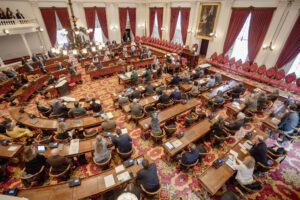On June 17th, the final gavel fell on the 2024 Legislative Session following a one-day veto session that saw the legislature override a half-dozen of the bills vetoed by Governor Scott. As the dust settles on an incredibly busy few months under the golden dome, we wanted to share some of the major implications for the mountain bike community and where VMBA has made progress in advancing the landscape for trails.
Act 250
First and top of mind for many Vermonters is H.687, also known as “the Act 250 bill,” which was one of the bills the legislature passed over the Governor’s objections. H.687 is a mammoth, compromise land management bill that aims to modernize Act 250 and increase the ability to develop more affordable housing, while protecting against forest fragmentation and development in environmentally sensitive areas. Functionally, the law will carve up Vermont into “Tiers” that will have different Act 250 jurisdiction and rules. No Act 250 permits will be required for many forms of development in Tier 1A and 1B, intended as town centers that must have certain local development oversight in place. Tier 2, likely to be most of the state, will see very limited changes to the current system, aside from a new road role that triggers permitting for longer private roads and driveways. Lastly, there is Tier 3, intended to cover sensitive natural resource areas including river corridors, headwater streams, habitat connectors, pristine waters, and certain natural communities, where Act 250 Jurisdiction will be automatic.
H.687 is providing critical reform to Act 250 that should promote more affordable housing, smarter development, and environmental protection. The major area of concern for VMBA remains the extent of and jurisdictional triggers for Tier 3, which will be defined through a multi-year rulemaking and stakeholder engagement process. Presently and thanks to our membership in the Vermont Trails System, trails constructed and maintained by VMBA Chapters are covered under the Municipal project trigger for Act 250 Jurisdiction, which allows any one project to disturb up to 10 acres of earth before a permit is required. Depending on how rulemaking goes, this may no longer apply for trails in Tier 3 lands – in which case all trails or any new trails in Tier 3 lands would automatically be under Act 250 Jurisdiction. And depending on the extent of Tier 3 lands, this could have massive implications for future access. This will unquestionably be a major focus of VMBA’s advocacy work over the next few years and underscores why our Strategic Plan aims to see trails in the Vermont Trails System exempted from Act 250 jurisdiction and placed under a more appropriate and effective regulatory mechanism.
Outdoor Recreation Bill
A major bill that would have had significant positive impacts on trail-based recreation in Vermont but did not cross the finish line was H.673, An Act relating to Vermont’s Outdoor Recreation Economy. This was legislation VMBA had a role in crafting, though our leadership of the Vermont Trails and Greenways Council, which would have funded a comprehensive outdoor recreation economic impact study, provided funding for the VTGC to fulfill its statutory requirements as an advisory body to the State of Vermont, and supported the development of universal Best Management Practices (BMPs) for the Vermont Trails System, an essential step in its possible future role as part of an alternative to Act 250 for trails. This bill passed the House Agriculture Committee 10-1, but failed to make it through House Appropriations – a fate many, many bills suffered this year given the extraordinarily tight State budget. We are working to pursue the goals of H.673 in alternate ways, and will continue to advocate for this level of investment and the future of outdoor recreation in Vermont.
Outdoor Recreation Day
 Outside of specific legislation, VMBA and the VTGC helped pull off the first ever Outdoor Recreation Day at the Statehouse on February 16th. Nearly 100 outdoor recreation advocates, including VMBA staff and Chapter leaders, filled the halls of the Statehouse to share the vital role outdoor recreation plays in Vermont, advocate for pro-recreation legislation, and connect directly with legislators. The day included a panel on the future of outdoor recreation, a devotional from Kelly Brush, founder of close VMBA partner the Kelly Brush Foundation, a Joint Resolution marking the day, testimony in various Legislative Committees, and a press conference. In short, it was a packed day that drove home the need for legislators to invest in and support the health of Vermont’s outdoor recreation economy, including trails. The second annual Vermont Outdoor Recreation Day is already scheduled for February 12th, 2025 – mark your calendars if you’d like to attend and join the action in person!
Outside of specific legislation, VMBA and the VTGC helped pull off the first ever Outdoor Recreation Day at the Statehouse on February 16th. Nearly 100 outdoor recreation advocates, including VMBA staff and Chapter leaders, filled the halls of the Statehouse to share the vital role outdoor recreation plays in Vermont, advocate for pro-recreation legislation, and connect directly with legislators. The day included a panel on the future of outdoor recreation, a devotional from Kelly Brush, founder of close VMBA partner the Kelly Brush Foundation, a Joint Resolution marking the day, testimony in various Legislative Committees, and a press conference. In short, it was a packed day that drove home the need for legislators to invest in and support the health of Vermont’s outdoor recreation economy, including trails. The second annual Vermont Outdoor Recreation Day is already scheduled for February 12th, 2025 – mark your calendars if you’d like to attend and join the action in person!
Vermont Conservation Strategy Initiative (30×30)
 And beyond the walls of the statehouse, this spring saw the advancement of two major statewide efforts that will have major implications for the future of trails and mountain biking in Vermont. Firstly, the Vermont Conservation Strategy Initiative, the process that is supporting Vermont’s commitment to permanently conserve 30% of the state by 2030 and 50% by 2050, is wrapping up its first of two phases focused on an inventory of current and possible future conservation opportunities. VMBA was actively involved in ensuring outdoor recreation organizations were named as a critical stakeholder group as part of the legislation that established the process, Act 59, and has been actively engaged the past 12 months in voicing both the value recreational trails can provide in fueling conservation efforts and the fact that public-access recreation itself is a recognized purpose for land conservation in Vermont. As phase two of VCS unfolds over the next 18 months, producing a plan for achieving the goals of Act 59, you can ensure VMBA will continue to be very active in seeing recreational trails achieve their full potential as a driver for and value-add to conservation.
And beyond the walls of the statehouse, this spring saw the advancement of two major statewide efforts that will have major implications for the future of trails and mountain biking in Vermont. Firstly, the Vermont Conservation Strategy Initiative, the process that is supporting Vermont’s commitment to permanently conserve 30% of the state by 2030 and 50% by 2050, is wrapping up its first of two phases focused on an inventory of current and possible future conservation opportunities. VMBA was actively involved in ensuring outdoor recreation organizations were named as a critical stakeholder group as part of the legislation that established the process, Act 59, and has been actively engaged the past 12 months in voicing both the value recreational trails can provide in fueling conservation efforts and the fact that public-access recreation itself is a recognized purpose for land conservation in Vermont. As phase two of VCS unfolds over the next 18 months, producing a plan for achieving the goals of Act 59, you can ensure VMBA will continue to be very active in seeing recreational trails achieve their full potential as a driver for and value-add to conservation.
Move Forward Together Vermont
The second major statewide effort coming to a conclusion late this Spring is Move Forward Together Vermont (MFTVT). The combination of Vermont’s Statewide Comprehensive Outdoor Recreation Plan (SCORP) and the Vermont Outdoor Recreation Economic Collaborative (VOREC) Action Plan, MFTVT aims to establish a shared vision for Vermont’s outdoor recreation future and a set of priorities and action steps for the next five years. VMBA has been part of the SCORP Technical Advisory Committee and involved over the past several months in the shaping of a Draft Vision and Priority Actions. Once finalized, this document will shape public funding, legislative goals, and various roles for organizations like VMBA. A series of community engagement sessions to collect public input are being hosted online and in-person throughout July – check out the MVTVT page to learn more about how to participate.
Looking Ahead
While the final gavel may have fallen for 2024, VMBA is already hard at work planning for the 2025 legislative session, working with our public and nonprofit partners to define priorities, craft legislation, and connect with legislators while they have more time and bandwidth to engage. This past session laid important groundwork for achieving our legislative goals of more fiscal support for trail stewardship, a more effective and appropriate regulatory framework, and a mechanism to better acknowledge landowners who allow public-access trails on their property, and we are excited to build on that momentum as we look ahead. None of this work would be possible without the support of our Members and contributions from our Supporters. Thank you, and stay tuned for another update this fall!
